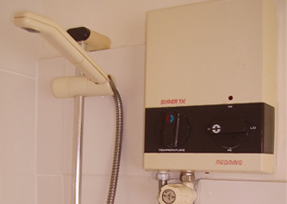The convenience of choosing a tankless water heater:
Tankless water heaters are known for their on demand water heating. Once a faucet is turned on, the water runs through the heating coils or heat exchanger of the water heater. This, in turn, heats the water to the desired temperature. The tankless water heater may run on electricity, gas, or propane. Gas tankless water heaters are found to have larger capacities than electric models.
Types of tankless water heaters:
Tankless water heaters may come in two forms. Some tankless water heaters are designed for individual points of use while there are other units which are designed to serve the water heating needs of the entire house. A point of use water heater is cheaper than a full house water heater. Installation of a tankless water heater is similar to that of a tank based water heater. The units are usually hung on the wall. A point of use model is usually kept under a sink or in a cabinet in an easily accessible area.
The advantage of using a tankless water heater:
The advantage of using a tankless water heater is that only the required amount of water is heated. Water is heated immediately which means there is no delay and it is unlikely that you will run out of hot water during a shower. The lifespan of these water heaters is up to 20 years while a traditional water heater lasts between 10 and 15 years.� The disadvantage of using such a water heater is that a small unit may not be able to cope with the demands of having a shower, washing clothes, and washing dishes at the same time.
Tankless water heaters have a smaller form factor and therefore manage to save valuable space. This is the primary reason that tankless water heaters have been used in Japan and Europe for over 75 years where space is a premium.
The efficiency of a water heater:
In terms of efficiency, a tankless water heater will deliver hot water at an efficiency of 98% throughout the life of the heater while a traditional water heater will manage to heat water at an efficiency of 80% in the initial year, which declines as the heater ages. Reducing the amount of energy used to heat water will help reduce the amount of fossil fuels being consumed. This, in turn, leads to a reduction of green house gas emissions. It has been stated that if North America were to replace traditional water heaters with tankless models, it would save 290 million gallons of fuel oil a year, 164 million gallons of propane or 6 billion hours of kilowatt electricity.










